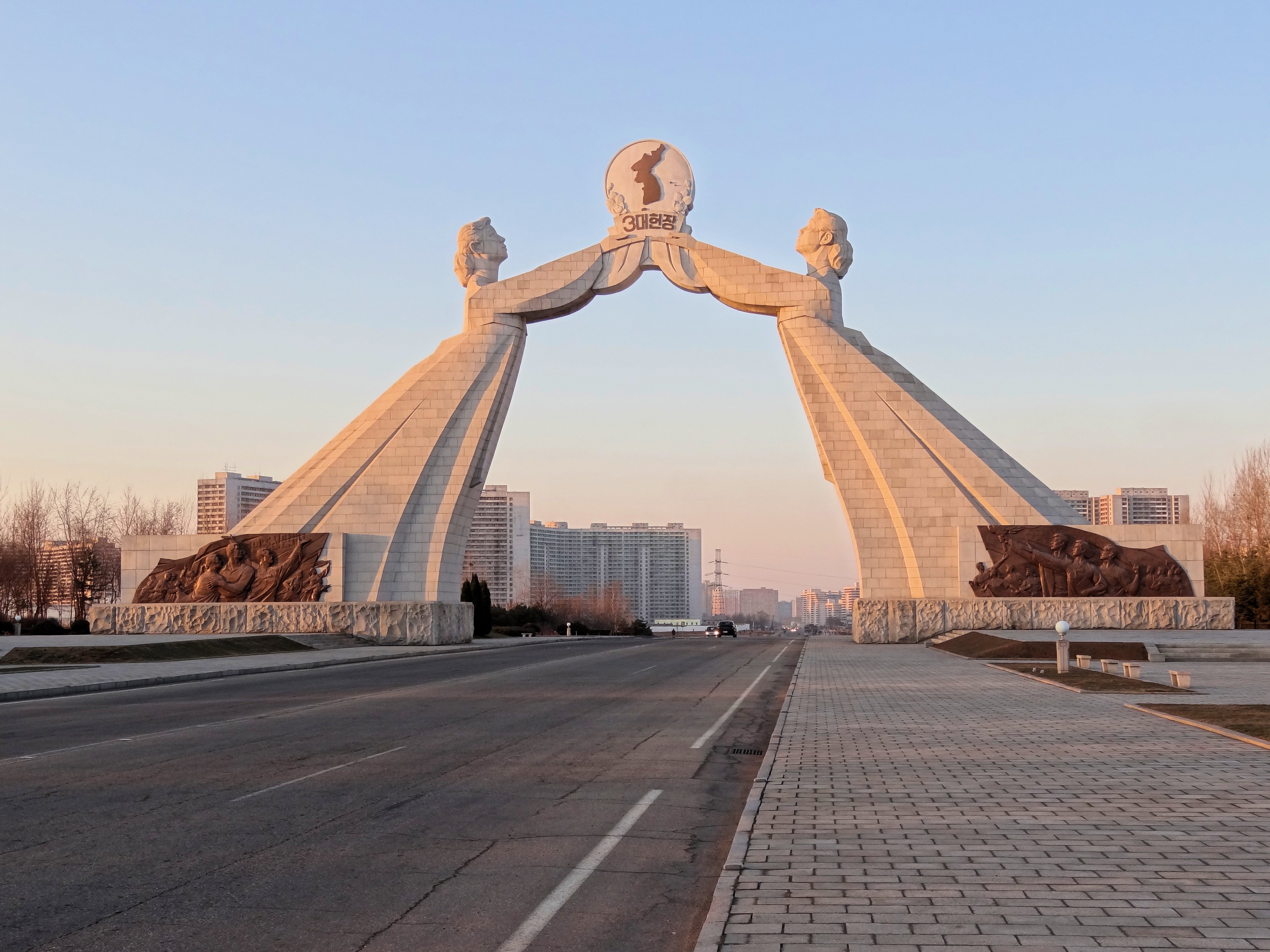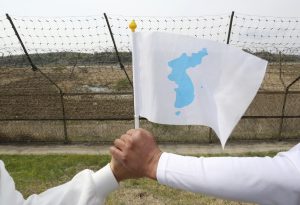In January this year, Kim Jong Un broke with decades of precedent and propaganda to declare that South Korea was an enemy nation and that the North would no longer be working toward reunification.
This August, South Korean President Yoon Suk-yeol paralleled Kim’s pivot away from ethno-nationalism when he announced a new “freedom-based” vision for unification that espouses a more universal human rights-based approach. While not going as far as Kim with threats to “pacify” or “occupy” the other Korea’s territory, critics have interpreted Yoon’s new doctrine as a threat to unify the two Koreas through absorption of the North.
While divergent in their goals, these high-level changes in unification policy indicate a move away from minjok-based justifications for unification. “Minjok” refers to a “common ethnic people,” usually connoting a shared Korean race, and has been a fundamental concept underpinning the rationale for reunification. The narrative shift is paralleled by growing risk of conflict that would compromise the possibility of the “peaceful unification” promoted by previous leaders.
Yet, do these rhetorical changes reflect the hearts and minds of ordinary Koreans?
South Korean opinion surveys demonstrate general apathy or even antipathy toward unification. Only 46.5 percent of South Korean millennials saw unification as necessary, and unlike their parents and grandparents, overwhelmingly cited national security as their primary reasoning, not minjok ties.
What do North Koreans think about unification? Public opinion in the North is far more difficult to gauge – but not impossible.
Unification Media Group, a Seoul-based NGO focused on freedom of information in North Korea, has been tracking North Korea’s efforts to erase decades of pro-unification indoctrination and propaganda. The regime has been systematically demolishing unification monuments and revamping its propaganda system, but eliminating pro-unification sentiment from residents’ hearts and minds has proved to be a much more challenging task. Read on to hear how the Kim regime is trying to literally and figuratively “erase” unification and how North Korean residents are reacting, in their own words.
Erasing “Unification” and “Minjok”
In January, Kim announced that “independence [자주], peace, and solidarity on the basis of minjok [must] henceforth be erased from the [North Korean] constitution” and added that “the very concepts of unification, reconciliation, and a shared [Korean] minjok must be eliminated.” Kim’s remarks turned out to be more than just empty words.
The most obvious symbol of the change in policy was the sudden demolition of the “Monument to the Three-Point Charter for National Reunification,” commonly known as the “Arch of Reunification.”
In his January 15 policy speech before the Supreme People’s Assembly, Kim described the Arch of Reunification as “an unseemly sight at the southern gate to the capital of Pyongyang” and ordered it to be torn down immediately. Satellite images confirm that the monument, located on Unification Street of Pyongyang’s Nakrang District, was demolished in late January, 24 years after its initial establishment.

The Arch of Reunification as it appeared in 2001, shortly after its construction. Image via Wikimedia Commons/ Bjørn Christian Tørrissen.
Other unification monuments across the country faced a similar fate and were demolished or otherwise had references to unification removed. (One such botched attempt was picked up by Radio Free Asia, when officials accidentally destroyed a monument entirely while removing a unification-related slogan.)
Another clearly visible and troubling indicator has been the thousands of soldiers deployed to the Demilitarized Zone (DMZ) to destroy railroads connecting the two Koreas and to plant thousands of new landmines, further entrenching the division of the Peninsula. While these actions are ostensibly taken to demonstrate that the North has “cut ties” with the South, it is likely that new landmines and barriers are actually aimed at making it more difficult to defect across the inter-Korean border. (Despite these risks, two North Koreans have made rare DMZ crossings in the last month.)
While not visible by satellite, another “erasure” order also spread quickly across the country, as the government called on schools to remove the word “unification” from textbooks. Beginning in March, the North Korean government issued orders for schools to “use ball pens or pencils to cross out and erase words in textbooks that the government has banned [such as unification, reconciliation, and shared minjok].” It was also reported that the government planned to issue new textbooks next year without these words.
At the same time, authorities also began to retroactively strike references to unification from state propaganda and films. Even the national anthem underwent modification, with its title shortened from “Three Thousand Li, Korea’s Natural Tapestry” to “Korea’s Beautiful Natural Tapestry.” The deleted phrase “three thousand li” generally alludes to a unified Korea, which would measure “three thousand li” from north to south.
No reference was too minor, evidenced as media authorities redrew the borders on a map of the Korean Peninsula to only highlight North Korea in a TV rebroadcast of a documentary about Kim’s activities in 2023.
North Korean Residents Confused by Kim’s “Anti-Unification” Policies
The government’s implementation of the new anti-unification policy appears drastic, yet it remains unclear whether these actions have the intended effect of convincing residents to give up hopes for peaceful reunification.
To better understand the relationship between rhetoric and public opinion, DailyNK and UMG surveyed multiple current North Korean residents to solicit their reactions to the new South Korea policy and unification erasure efforts. While the government’s policy changes have been swift and often permanent, our research suggests that people’s attitudes are significantly more resistant to change. The majority of residents expressed that they were thoroughly taken aback or confused by the new policies.
Daily NK reported that a man in his 60s in Pyongsong, North Pyongan Province, was arrested in March by the Ministry of State Security for allegedly expressing doubts about unification erasure measures. The man was arrested for “reactionary remarks” after allegedly complaining that “Reunification of the fatherland was the Dear Leader’s [Kim Il Sung’s] final wish, so I can’t understand why they are suddenly telling us not to use the word unification.”
This man was not alone in his skepticism. In the course of our research, UMG has collected remarks from multiple residents in response to the Kim Jong Un regime’s unification erasure efforts. We share some of them here, so you can hear residents’ reactions in their own words. Identifying information has been withheld to protect respondents’ identities.
“There’s no way to know when [the two Koreas] will be unified, but I had long privately wished that we would unify soon so that we could live well like people in other countries,” said a resident of North Hamgyong Province. “But now it seems like unification is completely impossible, so I’ve lost strength.”
Another resident of North Hamgyong Province said: “While I’d never had too high of expectations for unification, I had thought it would happen eventually. But after this plenary session [of the party] it became clear that there would be no unification going forward…It’s been shocking and disappointing.”
“After the Supreme People’s Assembly [session], the printing houses have been carrying out work to compile and remove phrases like ‘independence [자주],’ ‘peaceful unification,’ ‘unification of the [Korean] minjok,’ ‘solidarity of the Korean people,’ and [Kim Il Sung’s] ‘Three Principles [for Unification] Line’ from college textbooks and lecture plans,” said a 20-something student living in Pyongyang. “They really did demolish the Monument to the Three-Point Charter for National Reunification on Reunification Street.
“People seem bewildered by the current atmosphere and chaotic state of affairs,” the student continued. “Do we really need to completely throw away hope for reunification and optimism for the future? I hadn’t thought about this too deeply before, but it seems like Kim Jong Un is completely destroying the final teachings and accomplishments of the Leader [Kim Il Sung] and General [Kim Jong Il] and just looking to maintain good relations with Russia and China.”
“As this news has made its way through [the country], there have been lots of questions and even arguments between people sharing the news… But is it possible that we could go to war? If war breaks out, won’t people all just try to save themselves and run away?” wondered a government worker in their 40s.
“I think unification would be good for us, but looking at all of this fooling around I don’t think I’ll see unification in my lifetime,” lamented a 40-something salesclerk. “Given my age, if war suddenly breaks out, I think I might try and head to another country. Also, if we don’t reunify, I wonder if the Leader [Kim Il Sung] and General’s [Kim Jong Il’s] ideology will all disappear. The people just do as they are told, and if the party decides something, we have to do it.”
A housewife in her 50s had a similar perspective: “I had the depressing thought that I won’t get to see unification before I die. My heart aches. When they were building the [Reunification Arch], people from all over the country were mobilized to contribute money and manpower. By destroying that, do they think that the people’s long-cherished wish for fatherland reunification or their thoughts of ‘one peninsula, one Korea’ will disappear?”
Conclusion
It is not unusual for policy to precede changes in public opinion, or for policy to lead to eventual changes in social norms. However, North Korea’s lack of responsiveness to public opinion may well be a two way-street. The regime can change policy, but without the sense of buy-in or participation found in democratic governance, the regime will struggle to convince residents to internalize that policy.
In fact, if anything, many of our North Korean correspondents indicated a growing desire for unification in recent years, seeing unification as a path to enjoying the prosperous lifestyle of their southern neighbors. If the Kim regime cannot offer a convincing vision for an affluent North Korean future independent of the South, it will struggle to counter the people’s yearning for a better life and decades of its own pro-unification propaganda.
Monuments and song lyrics are easy to change; hearts and minds will take far more time. Even as South Koreans grow increasingly disinclined toward unification, we must remember and continue to work for the millions of Koreans who still dream of a peaceful unified future.
































